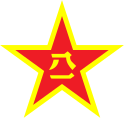| 中央军委 政治 工作 部 | |
 | |
| Descripción general de la agencia | |
|---|---|
| Anterior |
|
| Tipo | Departamento funcional de la Comisión Militar Central |
| Jurisdicción | Ejército Popular de Liberación |
| Sede | Complejo del Ministerio de Defensa Nacional ("Edificio del 1 de agosto"), Beijing |
| Ejecutivo de agencia |
|
| Departamento de padres | Comisión Militar Central |
 |
|---|
China portal
|
The Political Work Department of the Central Military Commission (Chinese: 中央军委政治工作部) is the chief political organ under the Central Military Commission.[1] It was created in January 2016 following the 2015 People's Republic of China military reform.[2][3] Its predecessor was the People's Liberation Army General Political Department.
The Department leads all political activities in the People's Liberation Army. Its current director is Admiral Miao Hua; its deputy directors are Hou Hehua and Yu Guang.[4]
The Political Work Department's Liaison Department controls a united front organization called the China Association for International Friendly Contact (CAIFC) that is active in overseas intelligence gathering and influence operations.[5][6][7][8]
References[edit]
- ^ Mattis, Peter (2018-01-30). "China's 'Three Warfares' in Perspective". War on the Rocks. Archived from the original on 2019-10-26. Retrieved 2019-10-26.
- ^ Kosaka, Tetsuro (January 28, 2016). "China's military reorganization could be a force for destabilization". The Nikkei. Archived from the original on October 26, 2019. Retrieved October 25, 2019.
- ^ Wen, Philip; Kang Lim, Benjamin (2017-09-08). "Sweeping change in China's military points to more firepower for Xi". Reuters. Archived from the original on 2019-10-26. Retrieved 2019-10-26.
- ^ Li, Nan (February 26, 2018). "Party Congress Reshuffle Strengthens Xi's Hold on Central Military Commission". Jamestown Foundation. Archived from the original on October 26, 2019. Retrieved 2019-10-26.
- ^ Hsiao, Russell (June 26, 2019). "A Preliminary Survey of CCP Influence Operations in Japan". Jamestown Foundation. Archived from the original on December 7, 2019. Retrieved 2019-11-30.
- ^ Stokes, Mark; Hsiao, Russell (October 14, 2013). "The People's Liberation Army General Political Department: Political Warfare with Chinese Characteristics". Project 2049 Institute. Archived from the original on December 29, 2019. Retrieved 2019-11-30.
- ^ Diamond, Larry, ed. (2019). China's Influence and American Interests : Promoting Constructive Vigilance. Chicago: Hoover Institution Press. ISBN 978-0-8179-2288-7. OCLC 1107586465.
- ^ Joske, Alex (June 9, 2020). "The party speaks for you: Foreign interference and the Chinese Communist Party's united front system". Australian Strategic Policy Institute. Archived from the original on June 9, 2020. Retrieved June 9, 2020.
See also[edit]
- Central Leading Group for Military Reform